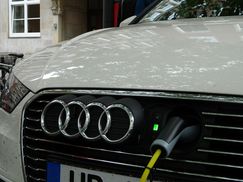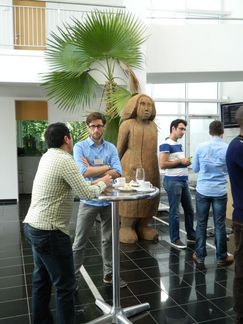E-Mobility
Structural bio-based electric car
Our colleagues from Eindhoven are involved in both: energy and material efficicency related to electro mobility as they are also working on sustainable materials.
Their statement:
"What is the purpose of a super-efficient car, when the process of producing the car nullifies its efficiency? We believe the production process should be altered in drastic ways. As the switch to electrical drivetrains requires significant changes to the vehicles’ design, we think that this is the perfect moment to step away from the traditional design mentality and start with a clean slate."
To get more information visit the official website:
Article: „E-Mobility“ – Workshop „How Efficient is Electro Mobility?“
How “green” is E-Mobility really?
The field of “e-mobility” is highly complex and highlights one of the greatest issues of the future. The field challenges many research disciplines, the political world and many economic sectors. In June 2015, at the invitation of the University of Oldenburg and the Hanse Wissenschaftskolleg, a high-quality, international panel of experts was assembled to discuss the status of development in this field and the current problems faced.
According to the Federal Motor Transport Authority of Germany, in the start of 2015 44.4 million passenger cars were registered, of which almost 19,000 were electric cars. The federal government aims to reach its goal of having one million electric cars on the country’s roads by the year 2020. "Given the manifold problems, this is a very ambitious goal, which cannot be achieved with introducing sales incentives only," asserts Alexandra Pehlken, head of the junior research group Cascade Use of the University of Oldenburg regarding the development plans of the nation. “There is also still a long way to go until the concept of E-Mobility really becomes a green solution.”
Because of their batteries, E-cars are not only considerably more expensive than cars with internal combustion engines, they are also heavier while yielding a short range and being burdened by long charging time. Additionally, the current refuelling infrastructure is aimed at combustion engines and not at electrical charging points or hydrogen supply for fuel cell vehicles. The recycling of these vehicles is equally problematic, with batteries posing a particular challenge. “In addition, electric cars require the use of new, partly scarce and environmentally problematic materials, which also repre-sents a major challenge in recycling,” says Pehlken. To find solutions, numerous disciplines are in-volved. For the electric car to succeed, diverse research engagement is required together with development of economic policies and stimulation and support of the federal government.
Full article (PDF, 695 KB)




